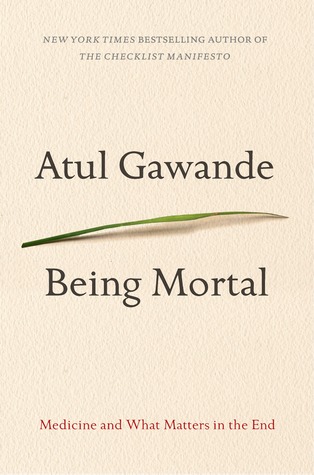Being Mortal – Atul Gawande
 For our May meeting, we discussed Being Mortal, by Atul Gawande. Wow, what a powerful discussion on such a wonderful book! I wasn’t quite sure what to expect because I know this can be a very emotional topic, and even uncomfortable for some people. Let’s face it, these are not the kinds of discussions we necessarily want to have with loved ones, not when it concerns mortality – our own and theirs. It is an important topic, however, so I really appreciated everyone’s candor, honesty and the stories shared during our meeting.
For our May meeting, we discussed Being Mortal, by Atul Gawande. Wow, what a powerful discussion on such a wonderful book! I wasn’t quite sure what to expect because I know this can be a very emotional topic, and even uncomfortable for some people. Let’s face it, these are not the kinds of discussions we necessarily want to have with loved ones, not when it concerns mortality – our own and theirs. It is an important topic, however, so I really appreciated everyone’s candor, honesty and the stories shared during our meeting.
The book takes us on a journey about aging and impending death, whether it be by illness or old age. And really, the focus is on having a good life rather than a good death. Using stories of real people and what they’ve been through, the author helps us understand that methods used to possibly extend life should be based on what the patient wants, not what the family members want. It is, after all, the patient’s life and when possible, he or she should be the one to decide what’s right for them.
Early in the book, Gawande walks us through the cycle of growing older, particularly when bodies don’t work as well as they used to and at some point, many people find themselves in need of different living arrangements and/or levels of care. He makes a point about that fact that when it comes to eldercare, everyone needs to have a reason for being; without it, we just exist, with it, we thrive.
With end-of-life comes decisions and some hospitals and nursing homes use questionaires prior to admittance to help navigate through some of these difficulties. I’m going to list the four questions Gawande mentions in the book because they’re a good place to start having those kinds of conversations within our own families. These questions are listed verbatim on page 179 in the book.
1. Do you want to be resuscitated if your heart stops?
2. Do you want aggressive treatments such as intubation and mechanical ventilation?
3. Do you want antibiotics?
4. Do you want tube or intravenous feeding if you can’t eat on your own?
One of the stories towards the end of the book focuses on having to make decisions regarding ICU and hospice – namely, which one to choose based on the patient’s desires and what treatments they would be willing to endure if it meant possibly living longer. In the story, the man said he’d be willing to endure a lot if he could still “eat chocolate ice cream and watch football on television”. Because the daughter had asked her father this question, the physician and the patient were able to determine the next steps, as well as the daughter when an emergency occurred and she already knew what her father’s wishes were. Had she not already had the conversation with her father, she may have made a different decision on how to proceed.
If you haven’t read the book, please pick up a copy. We ended up purchasing our own book after reading the library’s copy because we felt it was important to have around. It has also persuaded us to think about how this relates to our own families, as well as ourselves. Did it change my perspective? You bet it did and I am grateful.
Regarding local hospice arrangements for those readers in Sequim, you can visit the website of the Volunteer Hospice of Clallam County at www.vhocc.org for more information. If you’re interested, you can also check into volunteer positions.
Thanks,
Donna


